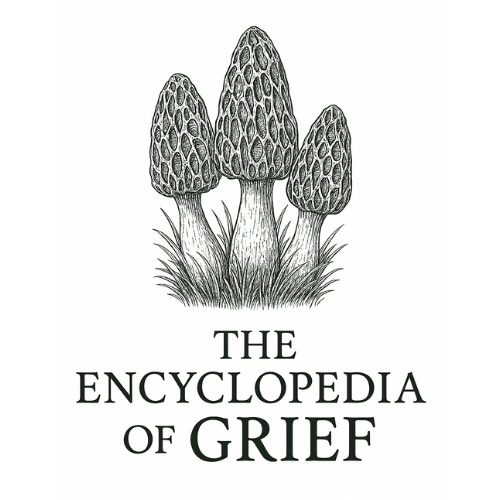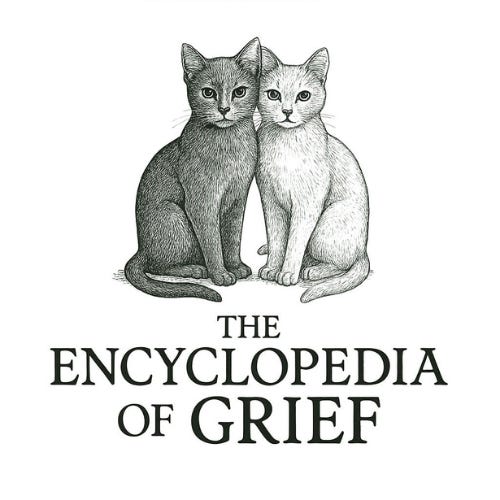FAQ
✦ What is The Encyclopedia of Grief?
The Encyclopedia of Grief is a weekly project naming the unspoken grief many of us cary from modern life. Each week, a new grief is named and explored, along with practices drawn from global traditions and modern day wisdom that can help us find community and support for often quite isolating experiences. Companion essays will also appear from time to time, exploring the broader questions about how we grieve, what we’re “allowed” to grieve, and what grief can become.
This project isn’t here to fix anything. Only people experiencing grief can choose the right path for them. But if you’ve ever wished for a place to bring the harder truths that most relationships can’t hold, you’re not alone.
You’re welcome to read, reflect, contribute, or simply be here. We’re so glad you found us.
✦ Why aren’t you writing about death?
The purpose of this encyclopedia is building a platform to find community in the grief we’re all experiencing in modern day life. That of course includes death, but also loss and unexpected change. The dream for this project is transforming it into a community-led project where contributors can write about the grief they’re experiencing in modern day life, whether it’s death or loss or change. And despite losing people in my life in the past, I’m not currently experiencing the grief of dying or watching a loved one actively dying.
That said, I hope to bring in voices experiencing those types of grief in the upcoming seasons. If you or someone you know is experiencing end-of-life grief and would love an outlet for writing about your experience, fill out our Share Your Story of Grief survey.
✦ What if I don’t know if what I’m feeling is grief?
Then you are in the right place. Grief does not always arrive dressed in mourning. It can show up as exhaustion, as restlessness, as rage or numbness. Sometimes it feels like silence. Sometimes it hides beneath ambition or burnout or shame.
This project was created for the unspoken kinds of sorrow. The ones that don’t make headlines, but live in the body. If something hurts and you don’t know where to put it, this space is for you.
✦ What if someone says this isn’t “real” grief?
Grief is not a contest. It is not a hierarchy. It is not a prize handed out to those with the worst losses.
Still, many people feel pressure to rank pain, especially online. They use comparison as a way to manage discomfort, to create order, to avoid vulnerability. But real witnessing asks us to set that down.
Here, we practice beginner’s mind. We let go of certainty. We meet each grief without assumption or measurement. In Zen Buddhism, this is called Shoshin—the openness of a beginner, who sees clearly because they do not claim to already know.
“In the beginner’s mind there are many possibilities. In the expert’s mind there are few.”— Shunryu Suzuki
If it hurts, it matters. If it lingers, it belongs. You do not have to prove your pain to be allowed to name it.
✦ Can I share this with someone?
Yes. Every entry is public unless otherwise noted. You can forward a post, share a link, or read one aloud with a friend. You do not have to explain why you’re sharing it. Sometimes offering a grief language is itself an act of care.
✦ What informs this project?
This work is shaped by:
My training as an end-of-life doula (UVM)
Conversations with elders, especially my grandmothers, who speak openly about death
Honest storytelling from friends, family, and strangers about grief and transformation
Somatic wisdom and trauma-informed practice
Mythic frameworks and symbolic ritual
Philosophers, mystics, and cultural critics who help us name what the modern world suppresses
You may notice influences from writers like bell hooks, Bayo Akomolafe, Resmaa Menakem, Neil Postman, and Clarissa Pinkola Estés. You will also find echoes of ancient spiritual traditions and Indigenous worldviews. These are not here to be borrowed. They are here to remind us what we forgot.
“Knowing others is intelligence. Knowing yourself is true wisdom.”— Lao Tzu
✦ How can I contribute?
In Season 2, beginning Fall 2025, I will start inviting stories from readers. You will be able to submit your own grief, anonymously or by name. Some submissions will be co-written or shared through interviews. Others will be published as guest-written entries.
If you are carrying something you want to name, I welcome you to share it when the time is right.
→ Submit to our Share Your Story of Grief survey
✦ Is this therapy?
No. This project is not a replacement for therapy or professional mental health support. It is not designed to fix or diagnose. It is a witnessing space. A digital grief circle. A ritualized offering. It may open something sacred in you, but it is not designed to carry acute crisis or clinical care.
If you are struggling, you are not alone. Please visit the Grief Resource Hub for support.
✦ What are the community guidelines?
This is a space for sacred witnessing, not performance or persuasion. We are not here to prove anything. We are here to feel and to hold space for others who are doing the same.
You are welcome to share your story, speak from your body, offer a candle emoji, or say nothing at all. Silence is part of the ritual here.
We ask that you do not give advice, debate someone else’s experience, or share trauma without warning. We also hold a zero-tolerance policy for harmful, intolerant, or dismissive language.
Please read the full Community Guidelines before participating.
✦ What’s next for this project?
Season 1 runs through September 16, 2025. That season is just the beginning. Over time, The Encyclopedia of Grief will expand to include collaborative essays, somatic toolkits, grief rituals, community gatherings, and a podcast.
I dream of building a public grief library. A place where silence breaks gently. A place for the living who are learning how to carry what cannot be fixed.
✦ Who created this, and why?
My name is Charlotte Rogg. I’m a writer and end-of-life doula-in-training. This project was born from a season of collapse. In the course of just a few months, I shut down a company I had built from the ground up, sat at the bedside of someone dying, and experienced quite a few experiences that brought death to the forefront of my life.
Each of these moments carried its own devastation. It’s hard to put into words the transformation I experienced during this time. In response to the immense level of grief I was feeling in my daily life, I started to study grief, not just emotionally but spiritually and structurally. From that season emerged a calling. I wanted to build something I did not have. A container where grief could go, even if there was no funeral, no label, no explanation. And most importantly, I started writing to process this emotional wave I’ve been riding.
I’m currently enrolled in UVM’s End-of-Life Doula course, with the intent of working with both humans and pet owners during their end-of-life experience. I’ll weave some of my experiences with the course into this Substack, and our Grief Resource Hub has quite a few resources I’ve found from my class. But eventually, I hope to open up this conversation to others who also want an outlet for their grief. Because community and connection saved me during this journey, and I have to assume it would do the same for others who are suffering in silence.
“You came empty-handed, and you will leave empty-handed. What is yours today belonged to someone else yesterday and will belong to someone else tomorrow.”— The Bhagavad Gita
✦ How can I support the Encyclopedia?
The most powerful support is presence. If you feel moved by this work, here are a few quiet ways you can help it grow:
Share it. Forward an entry to someone who might need it. Post it gently, with or without context. Let grief find those who are ready to name it.
Witness it. Leave a comment if you feel called. Not advice. Just presence. The kind that says: “I see this. I see you.”
Contribute to our Share Your Story of Grief Survey. I welcome unnamed griefs, story ideas, and questions for future entries. If something aches in you, and you don’t see it here yet, offer it. You can remain anonymous.
Honor the slowness. This project was built in stillness, not speed. There is no growth target. No content calendar. No algorithm to impress. If it feels meaningful to you, return. That’s enough.
Support financially (if and when it’s available). Paid subscriptions, gifts, and collaborations will be available in future seasons. Right now, we are growing the roots. One reader at a time.
This is not a brand. It’s a field of care. And everything helps it bloom.
Thank you for being here.
Warmly,
Charlotte



